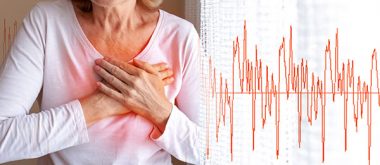Menopause marks a new stage in life that affects all women at some point. Some women experience few symptoms and are able to enjoy this time, while others struggle with symptoms such as insomnia, mood swings and hot flashes. Menopause typically occurs between the ages of 45 and 55, however, according to research, the median age for natural menopause has increased by 1.5 years over the past six decades. Obesity is associated with a variety of health problems. Research has already shown that being overweight can increase hot flashes during menopause, but there are also more serious health problems associated with it.
Menopause and Heart Problems
Menopausal women are more prone to heart problems because the female body produces less hormones such as estrogen and progesterone. Research has shown that women who enter menopause early (before the age of 45) have an increased risk of heart failure. This occurs when the heart is unable to pump enough blood and oxygen to keep the body’s organs functioning properly. However, recent studies show that obesity increases the risk of heart failure in women who experience a late menopause (55 or older). The researchers wanted to study whether and how obesity affects the risk of heart problems in older women.
Obesity During Menopause is Associated With an Increased Risk of Heart Failure
For their study, the experts used the health data of 4,500 postmenopausal women and divided them into different age groups when they entered menopausal stage. The weight was also measured. The risk of heart failure, which may be attributed to obesity, as measured by BMI, or waist circumference, was calculated after accounting for several other health and lifestyle risk factors for heart disease, including other conditions such as type 1 or type 2 diabetes, high blood pressure, renal function, inflammation, left ventricular hypertrophy and previous myocardial infarction. The researchers found significant associations between BMI, menopausal age, waist circumference and heart failure risk.
For every six-point increase in BMI, the risk of developing heart failure increased by 39 percent for women in the menopausal group before age 45; 33 percent for the 45-49 age group; and doubled (2.02 times higher) in women in the late menopausal group (age 55 or older). A higher BMI was not associated with an increased risk of heart failure in women who entered menopause between the ages of 50 and 54. For every 6-inch increase in waist circumference, the risk of heart failure almost tripled (2.93 times higher) in women who entered menopause at age 55 or older. Waist circumference did not significantly increase the risk of heart failure in women in any of the other menopausal age groups.
What surprised the researchers was that obese women with early menopause had a lower risk of heart failure than those who had late menopause. These findings underline the importance of healthy nutrition and exercise, especially in old age, in order to prevent obesity and protect against heart problems.
Menopause and Obesity Are Associated With COPD and Asthma
Other research has found that obesity can also lead to an increased risk of obstructive pulmonary disease (COPD) and asthma. Above all, abdominal obesity plays an important role. The incidence of COPD in overweight people is significantly higher than in people of normal weight. In addition, overweight women are more likely to suffer from asthma than overweight men. Little was known about the impact of obesity on COPD and asthma in pre- and postmenopausal women.
The study, published in the Journal of The North American Menopause Society (NAMS), found that obesity affects the risk of obstructive airway disease and can lead to deterioration in lung function. For this reason, it is important that women do not smoke and maintain a healthy weight to reduce their risk of developing COPD and asthma. Smoking impairs lung function. However, research shows that diseases such as COPD and asthma affect women more often than men.
Obese Postmenopausal Women Have an Increased Risk of Breast Cancer
Obesity also plays a role in the development of cancer. According to research published in Cancer Research postmenopausal obesity also impacts breast cancer risk. Affected women also show poorer clinical results compared to slim women. Studies in rats have shown that obesity and overnutrition after surgical oophorectomy drive aggressive tumor growth and progression. The reason for this was that the overweight rats couldn’t handle the excess energy sources in the form of glucose. In addition, obese rodents had higher progesterone receptor (PR) expression, which is associated with higher expression of genes involved in energy expenditure and proliferation.
A similar pattern of increased expression of genes involved in energy utilization and cell growth was observed in PR-positive human breast tumors from postmenopausal women. Although these studies were conducted on animals, they could also be extrapolated to humans. This in turn means that women should take steps to take care of their health as early as perimenopause. Lifestyle changes during this phase could reduce breast cancer risk and improve poor clinical outcomes.







